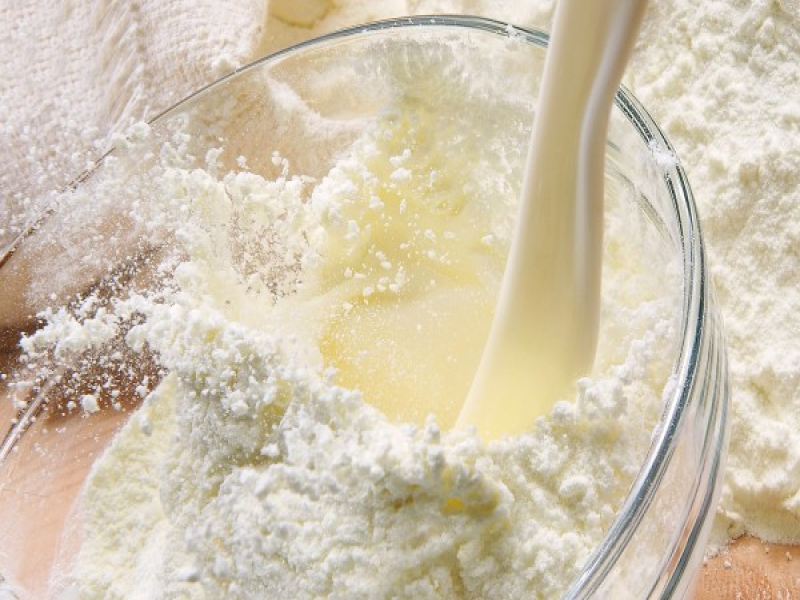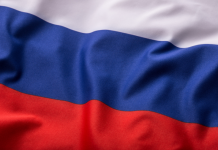2024 officially found the livestock sector in crisis. Those few remaining livestock farmers in Albania were forced to leave their herds and protest on the streets. The 30% decrease in the price of milk from small livestock was the core of the protests, but the sector’s concerns extended beyond. Over the past decade, the livestock sector has shrunk significantly, while the market is being ‘drowned’ by imports due to low costs. Albania imported 31 thousand tons of diary from abroad last year. Also, tons of palm oil and powdered milk have entered the local market.
Esmeralda Topi
Besart Kaba is one of the numerous southern livestock farmers who recently protested on the streets of Albania. At the beginning of this year, dairy farms and processing factories decided to reduce the price of milk from small livestock by 30%.
‘With these ridiculous prices we have in Albania, it’s like we’re working for the sheep, not the sheep for us’, says Besart.
Rarely do the protests of farmers yield results, but this time they did. Previously priced at 120 ALL (Albanian LEK) per liter, dairy farms and factories are currently purchasing milk from small livestock at 160 ALL per liter.
We won’t have to protest anymore because all the dairy farms have set the milk price at 160 ALL. We farmers aren’t as unified as those in Europe; the dairy farms lowered the price, and everyone withdrew’, sadly explains a farmer from Lazarat, Gjirokastër.
Besart has approximately 400 head of small livestock. He inherited the livestock from his father, but despite years in the sector, he views the future with uncertainty.
There isn’t a day that I don’t think about selling the livestock. If the milk price doesn’t reach 200 ALL per liter, the costs are too high for the farmers. I’m constantly wavering because it’s pointless to deal with these ridiculous prices. You have to sell them and move on, he concludes.
The livestock sector in crisis
Statistically, the Albanian livestock sector is in crisis, as the number of heads has significantly declined over the past decade. According to INSTAT, there were 356 thousand cattle in the country in 2013. By the end of 2022, their number decreased by 95 thousand.
There has also been a sharp decrease in the number of heads of small livestock. From 2.7 million heads of sheep/goats at the end of 2013, a decade later, there are 700 thousand fewer.
The number of heads by Livestock and Year Total, Head number
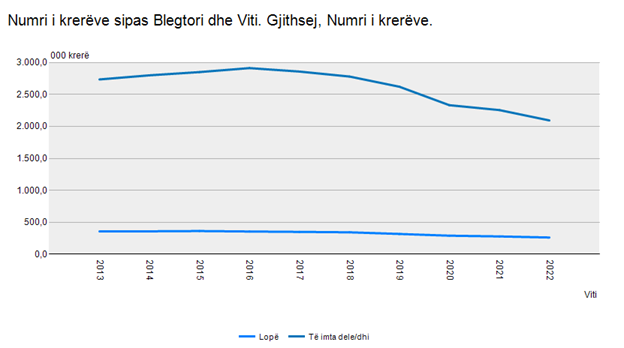
|
Cows, Small livestock sheep/goats
Source: INSTAT
The decrease in small livestock has also led to a decline in milk production. From 2013 until the end of 2022, milk production in Albania has decreased by 161 thousand tons.
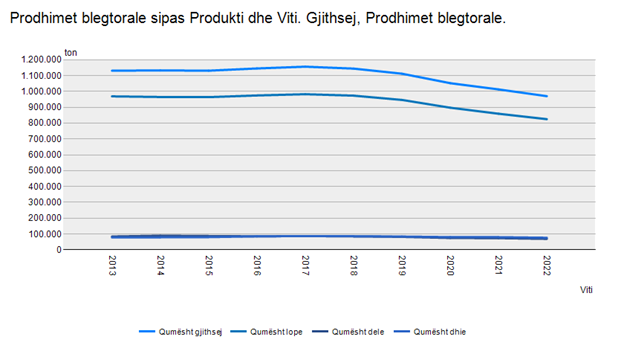
|
Source: INSTAT
Experts see the downward cycle of livestock as a consequence of lack of support and misguided fiscal policies towards the sector.
‘The livestock industry is in serious trouble. The main cause of the decline in the number of heads is the misguided fiscal policies. Another reason is subsidies, as the schemes are discriminatory. Livestock decline started in 2018, as evidenced by INSTAT figures. The final blow came from the tripling of agricultural inputs and the increase in food product prices.’ – said Eduard Sharka, Chairman of the Farmers’ Association.
In 2019, the Albanian government decided to decrease the reimbursement value-added tax refund on milk produced by local farmers from 20% to 6%.
Economic journalist Klodian Tomorri sees this move as the first strike against domestic milk production. The second blow, he adds, came three years later when the government decided to entirely eliminate the VAT refund for domestic milk, reducing it from 6% to zero.
‘If a processing factory, buys milk from local farmers for 100 ALL per liter, the real cost becomes 120 ALL per liter because they have to pay the VAT to the state, which is 20 ALL. But, when they buy imported milk for 100 ALL, then the real cost stays around 100 ALL, because the VAT paid at customs is credited. The result? Dairy processing factories find it more profitable to import milk rather than purchase it from local farmers.’ – Klodian Tomorri, Economic Journalist.
In these circumstances, the Association of Dairy Processors in Albania foresees a tough year for the livestock sector.
If livestock does not receive the adequate budget as in the region and subsidy schemes are not aimed at production, then in 2024, the number of livestock will decrease, resulting in a reduction in the quantity of milk produced.’ – Milk Processors Association.
Processors see a solution in fiscal policy changes, stating that pressure from imports is increasing at the expense of local production.
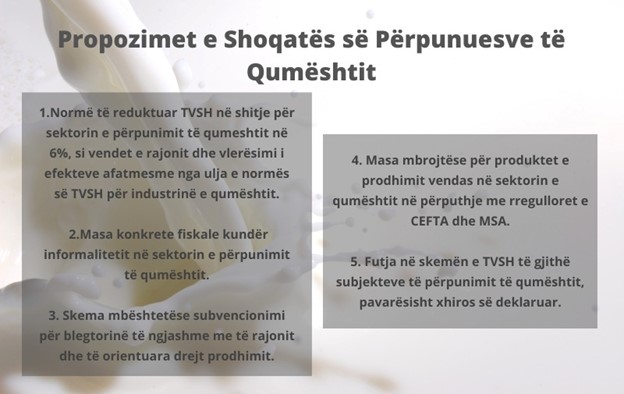
| Proposals of the Association of Milk Processors
1. Reduced VAT rate on sales for the dairy processing sector to 6%, in line with regional countries, and assessment of long-term effects of VAT rate reduction on the dairy industry. 2. Specific fiscal measures against informality in the dairy processing sector. 3. Supportive subsidy schemes for livestock similar to those in the region and oriented towards production 4. Protective measures for domestically produced products in the dairy sector in accordance with CEFTA and SAA regulations. 5. Inclusion of all dairy processing entities in the VAT scheme, regardless of declared turnover.
|
The market is suffocated by imports
As the livestock sector has been bearing the burden for years, the domestic market is being ‘drowned’ by imports. Last year, Albania imported 31 thousand tons of dairy products from abroad. Year after year, domestic production is being displaced by foreign production.
This indicator, as Professor Ndoc Fasllia suggests, should serve as an alarm bell for every government.
In a country like Albania, where the resident population has decreased, thus reducing the number of consumers, food imports continue to increase…!!! Why does this happen? Because, domestic production has decreased, as a result of the decline in the number of heads and as a result of abandonment of villages.’ – Ndoc Fasllia, Professor at the Agricultural University.
Another concerning indicator regarding imports, according to experts, is the increase of powdered milk imports.
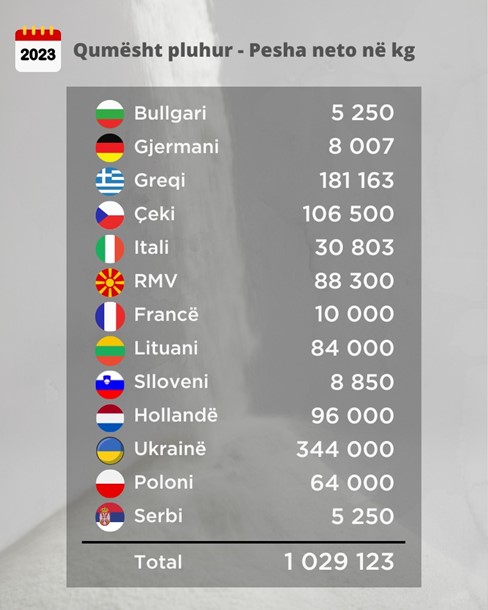
Last year, Albania imported 1 ton of powdered milk from abroad. The top three main origins are Ukraine, Greece, and Czech Republic.
‘It’s concerning because we’ve reached a point where powdered milk is replacing fresh milk. And that’s why livestock farmers protested, because powdered milk, both domestic and imported, is suffocating domestic production due to its lower cost,’ argues Professor Abdyl Sinani.
Official data also indicate that last year tons of palm oil entered Albania.
At the end of 2023, Albania imported 3100 tons of palm oil. According to the data, 54% of this product is imported from Indonesia. Malaysia takes the second spot in imports, followed by Greece.
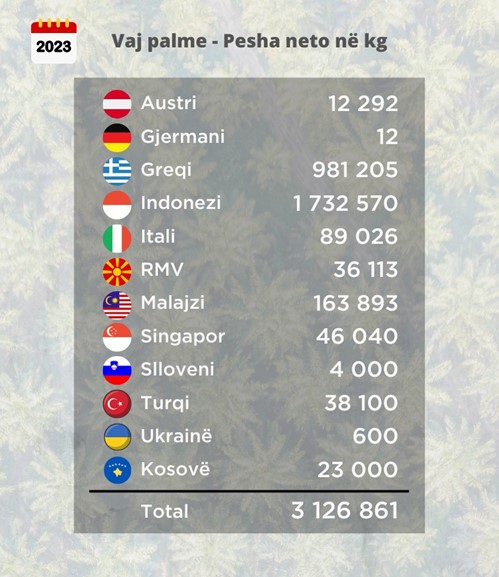
Food safety experts state that the annual rise in palm oil imports necessitates strict monitoring of its parameters, as its indiscriminate use poses a health risk to consumers.
‘The first step is palm oil quality control. The National Food Authority should inspect the quality of this product before it is released into the market to ensure it meets the permissible parameters. Because, if it doesn’t meet the parameters, it poses a serious risk to consumer health. On the other hand, businesses using palm oil are obliged to indicate on the label the percentage of palm oil used, whether in desserts or dairy products. All products containing palm oil’ – Abdyl Sinani, professor at the Faculty of Food Biotechnology.
In 2017, there was a broad debate in Albania regarding the use of palm oil in dairy products. Reports of an investigative program on the indiscriminate use of palm oil in dairy products prompted action from institutions in the country. At that time, the National Food Authority warned of taking action against businesses found in violation.
However, the truth is that from the time of this campaign until now, there have been no concrete results in this regard.

